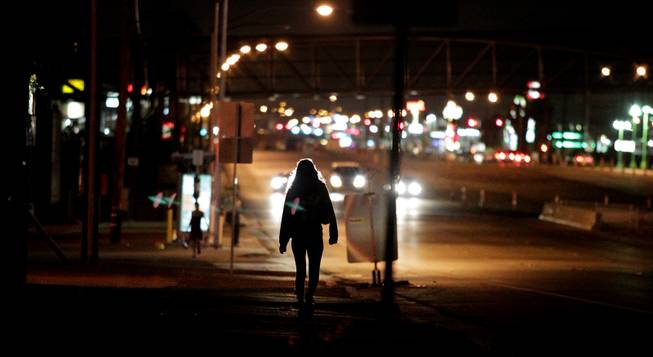
In an effort to reduce the number of repeat offenders, Assembly Bill 260 would penalize illegal sex buyers and send them to rehabilitation programs.
Thursday, March 23, 2017 | 2 a.m.
Related Coverage
A bill penalizing illegal sex buyers and sending them to rehabilitation programs is intended to reduce the number of repeat offenders, says the lawmaker behind the legislation.
First-time offenses are still a misdemeanor under Assembly Bill 260, but people seeking illegal prostitution would also face a minimum fine of $400. The crime escalates up to a gross misdemeanor and at least a $1,300 fine for a third violation, as well as a $200 civil penalty per offense.
Funds would go toward programs and enforcement. The bill allows suspended sentences for first-time offenders if they attend programs like so-called john schools where available. A program in Washoe County is funded through fees and relies on courts to order participants to attend.
Victim impact panels similar to those used for certain DUI offenders were also discussed as possible programs to deter repeat offenses.
Assemblywoman Jill Tolles, R-Reno, said during a Judiciary Committee hearing Wednesday that she joined police during a sting operation and saw men arrested from a variety of backgrounds. They included a married father, an attendant at the establishment where she gets her car washed and men in their 60s who have been buying sex illegally since their teens.
“As I asked them questions — about how long had they been buying sex illegally, are they aware of the cycles of violence that come along with this industry and this trade, and why do they go to a street corner instead of to a legal brothel — I was struck by some of the answers,” she said.
Many said they didn’t go to legal brothels because of convenience and cost, Tolles said, and buyers didn’t understand how their participation in the crime continued cycles of violence related to prostitution.
The committee heard testimony from victim advocates who said many prostitutes faced sexual violence and exploitation as children, leading them to prostitution in adulthood.
Sex trafficking survivor Kimberly Mull, of the Nevada Coalition to End Domestic and Sexual Violence, said she and many others were first victimized as children. She said pimps and traffickers make it dangerous to fight back.
“You feed into that fantasy because your life depends on it, and I mean literally,” she said. “I know girls who didn’t make it out. I’ve been to too many funerals for my age because of this situation, so buyers have to be held accountable.”
Some who spoke during the hearing raised the topic of legal prostitution. Wendy Stolyarov of the Libertarian Party of Nevada was among those who pointed to Amnesty International’s call to decriminalize consensual sex work as a way to protect the rights of sex workers.
“AB260 would sweep up consenting individuals as well, and it’s not the government’s role to tell consenting individuals what they can and cannot do with their bodies,” Stolyarov said. “The Libertarian Party of Nevada therefore opposes AB260 and concurs with Amnesty International that the best way to protect sex workers is to legalize their industry in Washoe and Clark counties.”
Tolles said there is conflicting research on whether legalizing prostitution is beneficial to sex workers, noting data that shows the illegal sex trade flourishes in areas with legal prostitution.
“With this bill, we want to focus on the illegal sex trade and the exploitation of women that is currently happening,” she said.
She said traffickers and prostitutes are penalized under the law, and that the buyers need to be held accountable as well in order to deter demand.
Committee members asked for more research about the impact of john schools, data on the state’s experience with similar programs, and the impact of legal versus illegal prostitution, among other requests.
Tolles said she’s open to changes to the language of the bill to prevent unintended consequences, as well as other clarifications in penalties, such as possible diversion programs for first-time offenders, and the types of rehabilitation programs that would be used.
No action was taken on the bill.

Join the Discussion:
Check this out for a full explanation of our conversion to the LiveFyre commenting system and instructions on how to sign up for an account.
Full comments policy